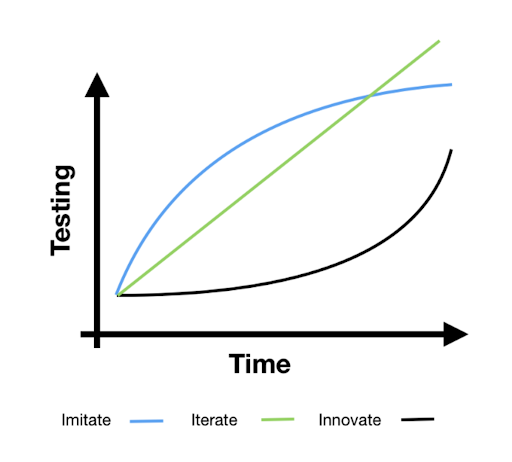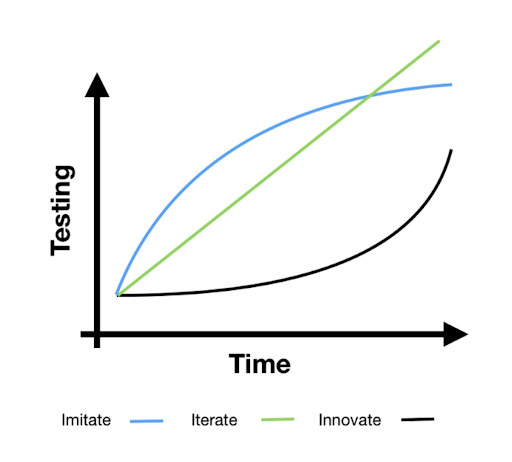Jonathan Martinez
More posts from Jonathan Martinez
When you look at early Uber or Lyft, they were notorious for copying each other on offers, features and more. A recent look at Instagram reveals how they’ve added new features to their product over the last few years to fend off competitors such as Snapchat (Stories) and TikTok (Reels).
There’s a lesson here: If you’re not imitating what growth marketing industry leaders are already doing in your vertical as a startup, you’re going to be adding months and possibly years of unnecessary testing to your timeline. To be clear, I’m not stating that you should be copying your competitors’ website designs and print copy word for word. There’s a clear line between copying everything a competitor does exactly and using frameworks outside while adding your own flavor — make sure you do the latter.
But if even the major players are using imitation tactics strategically, it’s even more important to imitate as a startup. Instagram is a multibillion-dollar company today and they’re still reaping the benefits from imitation! However, it’s even more critical for startups to imitate than established players because the pockets just aren’t as deep.
I’ll be utilizing the Triple I Model to help you understand the startup curve for imitating, and add a few examples from my days working on the growth team at Postmates.
Triple I Model
The Triple I Model consists of three pillars: imitate, iterate, and innovate. As a startup, you’ll have opportunities to do all of these, but how you emphasize each will be crucial in the early stages.
While trying to gain traction in the early years, most of your time and attention should be focused on imitating successful marketing tactics. This means drawing inspiration from competitors on their ads, emails, website, and other consumer touchpoints.

Iterating can happen in tandem as you achieve wins from successful imitations, and it should be a constant process to improve metrics. If you do feel you have a groundbreaking idea you’d like to test, go ahead. I’m not saying you shouldn’t innovate. I have done this when consulting for small seed-startups.
What I am saying is that instead of expending so many resources on the uncertainty of innovation, early on there’s so much more for your startup to gain from imitation. There’s no need to constantly reinvent the wheel. Conserve your resources to innovate for high-probability tests that you’re excited to try at various stages of your startup’s life.
However, it must be said that these ‘home run swings’ should be reserved for those times when there are ample resources to allow for experimentation.
Imitating on paid acquisition
At Postmates, most of my time was spent scaling our acquisition efforts. We upped our spending from $50,000/month to $5 million/month. After raising $300 million in Series E, we had plenty of monetary resources to scale as we unlocked new paid channels. However, we still lacked adequate resources on the design side. Our team had to get crafty with repurposing or imitating designs that DoorDash and other competitors were launching. I personally kept an eye on the competitors and their ad libraries on a weekly basis to make sure we stayed on top of any trends.
Outside of our food-delivery competitor set at Postmates, I would also look through top brands that were known for cutting-edge marketing and user-acquisition tactics. This helped me decide on the pillars we needed to test if I saw patterns emerging among the many companies I followed. In 2022, user-generated-content became king, and many advertisers picked up on that trend by launching their own versions of this ad pillar.
Instead of going to my design team at Postmates with ten pillars I wanted to test, which would be impossible resource-wise, I would approach them with two pillars that I knew were working based on competitors’ ad launches.
To speed up imitation on paid acquisition, Meta has an ad library where you can search for companies and see all the ads that they’re currently running. A trick here is to look at the date the company launched an asset, because often it is the ads that were running the longest that are the most performant.
Imitating on activation
The other steps in the growth funnel, such as activation, won’t be as obvious to imitate as acquisition, where ads are public on platforms such as Meta. So how does one draw inspiration?
Most of my former fellow employees at Postmates would sign up for DoorDash and other competitor accounts to understand how they were onboarding users and the types of emails they were sending. If you’re not already going through your competitor’s funnel, this is an absolute must. It’s not enough to sign up once, since your competitors are constantly experimenting as well, so make sure to set up a regular cadence for checking in on how they’re pushing users through the funnel. By doing this, you’ll be piggy-backing off the work they’re doing on the experimentation front.
There are also resources, such as reallygoodemails.com, which is an online library of emails that companies are sending that you can obtain ideas from. In addition, hopping on calls with past employees of your competitors can be a fruitful way to expedite learning their growth tactics.
When to start innovating
If you’ve exhausted all imitations in paid acquisition, your email copy and content, promo offerings, and other growth efforts, then it’s your time to innovate. However, that should never be your sole focus as there will always be something or someone else to imitate. If it’s not your direct competitor, it’s someone in your vertical, or even further removed, such as an industry growth leader.
Instead of thinking about when to innovate, the question should be whether an innovative growth idea will outweigh X number of imitations with the same resources.

After Postmates was acquired by Uber in 2020, I landed on the growth team there where I learned how much time, money, and effort went into competitive research. As a public company worth $89.9 billion in 2020, Uber was still investing vast resources to imitate the top styles and ideas from other players in the industry.
Coinbase’s famous Super Bowl QR code ad took several months to create. What may seem like simple decisions, such as if we should let the QR code touch the corner perfectly, became part of large debates to analyze the pros and cons of each variation. There were also major efforts on making sure the QR code was scannable on various TV sizes and resolutions. For startups, this is simply too resource-intensive to accomplish. It shows that no matter the size of the company, imitation is still happening and very few are spending time on innovating.































Comment